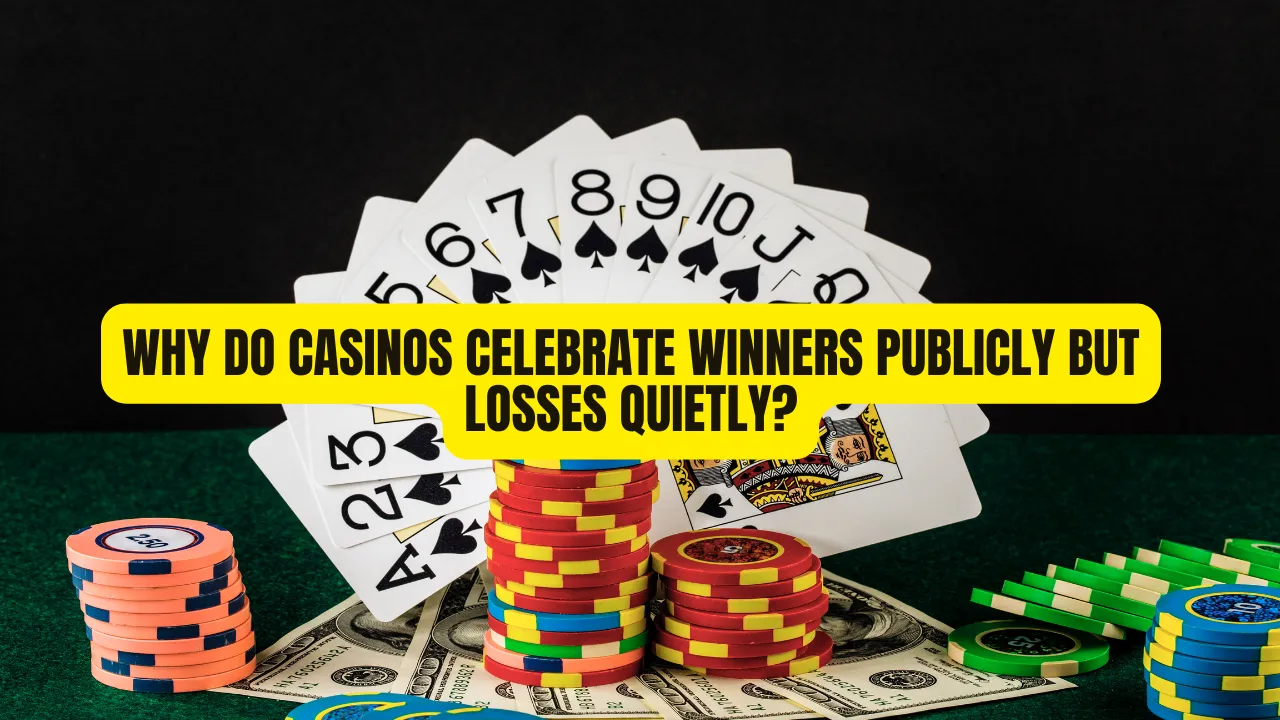Step into any casino and you’ll notice an interesting dynamic: when someone wins big, the moment is amplified with bells, flashing lights, or even public announcements. The environment is designed to make sure everyone knows a winner has just struck gold. Yet, when players lose — as most eventually do — the experience is subdued, often invisible to others. This contrast is no accident.
Casinos understand human psychology better than most businesses, and the way they celebrate wins while quietly absorbing losses is one of their most effective strategies. It’s a deliberate method of shaping perceptions, creating excitement, and keeping people engaged. Let’s explore why this happens and what it reveals about both casino operations and player behavior.
The Psychology of Highlighting Wins
Casinos thrive on spectacle. A jackpot win on a slot machine doesn’t just reward the player — it sends a ripple of excitement across the gaming floor. The sight and sound of someone else’s success taps into what psychologists call “social proof.” When people see others winning, they’re more likely to believe they too can win.
This illusion of attainability is one of the most powerful motivators in gambling. Even though the mathematical odds remain unchanged, seeing someone hit a jackpot or receive a massive payout gives others a reason to keep playing. By celebrating wins publicly, casinos reinforce the perception that big wins are not just possible but imminent.
In contrast, losses are normalized by silence. Nobody points out when someone quietly folds a losing poker hand or drains their wallet on a slot machine. This keeps the atmosphere optimistic, focused on potential rather than reality.
Why Losses Stay Quiet
Losses are the engine that drives casino profits, but highlighting them would be counterproductive. Imagine if every losing hand or spin were accompanied by a sound effect or announcement. The environment would feel depressing, discouraging players from continuing.
By keeping losses quiet, casinos minimize the negative emotions associated with gambling. Players internalize losses privately, often rationalizing them as temporary setbacks. The overall mood of the casino floor remains energetic, fun, and hopeful, even though most people are losing more often than winning.
This strategy mirrors broader marketing principles: businesses rarely highlight customer failures. Instead, they promote success stories, testimonials, and positive outcomes. Casinos simply apply this idea at scale, using atmosphere as a marketing tool.
Reinforcing the Entertainment Narrative
Another reason casinos celebrate wins publicly is to emphasize gambling as entertainment rather than just financial risk. When you see someone jumping in joy after a lucky spin, it feels like part of the show. The casino becomes a stage where excitement unfolds in real time.
Losses, on the other hand, are framed as part of the cost of entertainment. Just like buying a movie ticket or attending a concert, spending money at a casino is subtly positioned as paying for the experience rather than expecting a guaranteed return. By not spotlighting losses, casinos reinforce this framing, keeping the overall narrative upbeat.
Public Wins and Social Influence
Humans are social creatures, and casinos know how to use this to their advantage. Publicly celebrating winners creates a contagious atmosphere. You might not even know the person who just hit the jackpot, but seeing their excitement fuels your own optimism.
This is why slot machines are often designed with visible and audible win signals. Even modest payouts trigger celebratory sounds, tricking both the winner and surrounding players into perceiving the event as significant. It’s less about the amount and more about the impression it leaves.
In digital spaces, the same logic applies. Online platforms often display pop-up notifications like “Player X just won £500 on Roulette!” to simulate the casino floor effect. Even on platforms like non gamstop casinos, these publicized wins serve to encourage continued play, reinforcing the belief that success is just around the corner.
The Role of Selective Memory
Interestingly, players themselves contribute to this imbalance between celebrating wins and forgetting losses. Human memory is naturally biased toward recalling emotionally charged events, particularly positive ones. A big win feels exciting and memorable, while a series of small losses blends into the background.
Casinos exploit this tendency by amplifying moments of victory. When you remember your night at a casino, chances are you’ll recall the thrill of hitting a bonus round rather than the steady drip of wagers that didn’t pay out. This selective memory keeps people coming back, convinced they’re closer to winning big than they really are.
Responsible Gambling and the Hidden Risk
While this system works well for casinos, it does raise concerns around responsible gambling. By celebrating wins publicly and keeping losses invisible, casinos risk masking the true financial impact of gambling. This can encourage vulnerable players to overestimate their chances and spend more than they can afford.
To counteract this, regulators in many regions now require casinos to promote responsible gambling messages. Some online platforms incorporate tools that show players their win-loss history clearly, breaking through the selective memory bias. But the fundamental contrast — wins in the spotlight, losses in the shadows — remains deeply embedded in casino culture.
What It Means for Players
Understanding this dynamic gives players a clearer perspective on the casino experience. Wins are amplified not because they’re common, but because they’re rare and valuable to the casino’s marketing strategy. Losses remain quiet not because they don’t matter, but because they’re so frequent they form the backbone of the business model.
If you approach gambling with this awareness, you can make more informed choices. Enjoy the excitement of the wins, but don’t forget the quieter reality of losses that sustain the entire industry.
Conclusion
Casinos are masters of perception. By celebrating winners publicly and handling losses quietly, they maintain an environment of excitement, optimism, and possibility. This strategy is deeply rooted in psychology, shaping how players perceive risk and reward.
For casinos, it’s an effective formula: highlight the rare moments of success, downplay the common reality of loss, and keep the entertainment narrative alive. For players, the key is to recognize this dynamic and gamble with both awareness and responsibility.
The next time you hear the bells of a slot machine or see someone walking away with a giant check, remember — you’re witnessing a carefully orchestrated part of the casino experience, designed to keep the energy flowing and the games in motion.








